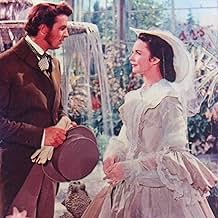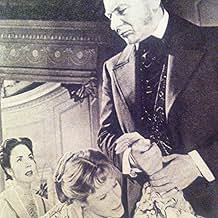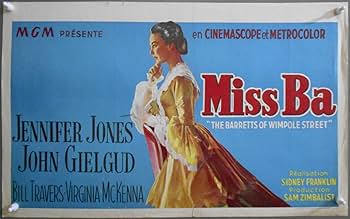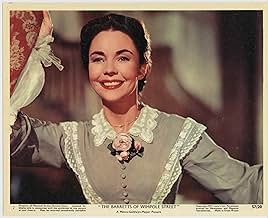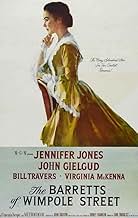IMDb RATING
6.5/10
619
YOUR RATING
Elizabeth Barrett's tyrannical father has forbidden any of his family to marry. Nevertheless, Elizabeth falls in love with the poet Robert Browning.Elizabeth Barrett's tyrannical father has forbidden any of his family to marry. Nevertheless, Elizabeth falls in love with the poet Robert Browning.Elizabeth Barrett's tyrannical father has forbidden any of his family to marry. Nevertheless, Elizabeth falls in love with the poet Robert Browning.
Christopher Cooke
- Minor Role
- (uncredited)
- Director
- Writers
- All cast & crew
- Production, box office & more at IMDbPro
Featured reviews
"The Barretts of Wimpole Street" (1957) is a word-for-word remake of the classic 1934 version by the same name. And, as such, I wonder why anyone should even bother seeing this film. After all, since the original version was a very nice and well-acted film (despite Charles Laughton overacting a bit), I can't see seeing a re-make--especially one that took almost no effort to make. Now I am not saying the 1957 film is bad--it is lovely to look at and the story is interesting. I just don't believe in rewarding studios for slap-dash remakes. In fact, unless the original film is seriously flawed and the remake corrects this, I can see no logical reason to see the remake and usually make it a habit to avoid them! So why did I watch the 1957 film? Well, I was flying cross-country and this film was one of the choices on the menu for in-flight films. And, in this sense, it fit the bill--and was pleasant but not particularly inspired.
I've never seen the 1934 version, so I have nothing to compare with, but John Gielgud was sufficiently overbearing, cold, and creepy in the 1957 The Barretts of Wimpole Street for me to not even want to rent the original. There's an undercurrent of incest when he exerts control over his daughter, so it was probably a risk for him to take the role.
It was not a risk, however, for Jennifer Jones to take on Elizabeth Barrett. She's the queen of melodrama (the predecessor of Susan Hayward) and often has characters who get sick or die in her films. In this one, Jonesie is an invalid and meekly submits to all her father's wishes - until one day she meets the energetic, magnetic Robert Browning (played by Bill Travers). They write each other beautiful letters and fall in love, but she fears they can never overtake her father. It's a classic melodrama and shows off her great training as a heavy dramatic actress.
Young Virginia McKenna nearly steals the show as Jonesie's younger, fiery sister who occasionally has the guts to stand up to their father. They're both clad in beautiful period gowns, and Virginia has a fresh-faced sweetness mixed spunk that reminded me of Katharine Hepburn in Alice Adams. Plus it's really cute to see her act with her husband when they're not paired up as love interests. There aren't any Born Free sparks between them; it's called acting, and Virginia lets Bill romance her onscreen sister.
It was not a risk, however, for Jennifer Jones to take on Elizabeth Barrett. She's the queen of melodrama (the predecessor of Susan Hayward) and often has characters who get sick or die in her films. In this one, Jonesie is an invalid and meekly submits to all her father's wishes - until one day she meets the energetic, magnetic Robert Browning (played by Bill Travers). They write each other beautiful letters and fall in love, but she fears they can never overtake her father. It's a classic melodrama and shows off her great training as a heavy dramatic actress.
Young Virginia McKenna nearly steals the show as Jonesie's younger, fiery sister who occasionally has the guts to stand up to their father. They're both clad in beautiful period gowns, and Virginia has a fresh-faced sweetness mixed spunk that reminded me of Katharine Hepburn in Alice Adams. Plus it's really cute to see her act with her husband when they're not paired up as love interests. There aren't any Born Free sparks between them; it's called acting, and Virginia lets Bill romance her onscreen sister.
MGM were on the slide in the fifties. They decided to combat the decline in audiences by remaking past successes in colour and wide-screen. Sometimes this worked as with Ben Hur,but mostly failed abysmally. This is a case in point. They didn't bother to do research into whom would be interested in seeing this film. They remade the 1934 film. Now colour was fine but wide-screen is ridiculous. This is a stage bound film and the pictorial composition is dictated by this. People conversing for both edges of the screen and inability to compose close ups.
This film is quite full at times. Better leading actors were essential to give this a chance of being remotely interesting.
This film is quite full at times. Better leading actors were essential to give this a chance of being remotely interesting.
Being owned by two English cocker spaniels my comments are a bit biased.
This film is intriguing, not just for the overall story but the way Flush, Elizabeth's cocker, was so much integral part of it. Given the 120 line poem that she wrote about Flush it was pleasing to see that Flush was very much a part of the movie.
Sir John Gielgud was a superb actor cast in the role of Elizabeth's tyrannical father. Jennifer Jones performance above par. And of course there was Flush. One very lucky cocker spaniel.
This film is intriguing, not just for the overall story but the way Flush, Elizabeth's cocker, was so much integral part of it. Given the 120 line poem that she wrote about Flush it was pleasing to see that Flush was very much a part of the movie.
Sir John Gielgud was a superb actor cast in the role of Elizabeth's tyrannical father. Jennifer Jones performance above par. And of course there was Flush. One very lucky cocker spaniel.
1957's 'The Barretts of Wimpole Street' is not the first version of Rudolf Beiser's stage play or the real life romance of Elizabeth Barrett and Robert Browning. There is also the 1934 film, seen two years ago, with Fredric March, Norma Shearer and Charles Laughton and aslso directed by Sidney Franklin, which is on the whole a great film especially the performances of Shearer and Laughton (March and the overlength being the weak links). Despite being nervous about it being an extremely close remake, it was still seen anyway because of the story and for the wonderful Sir John Gielgud.
Actually found this a well worth watching and worthy remake, or more other version, and it fares better than quite a lot of them. The reason why there was apprehension about this is due to having seen some very close, word for word, shot for shot remakes that are abysmally executed, a very strong example being 1998's 'Psycho', and was really hoping that it would not be on that level. Thankfully it's not and it didn't feel completely pointless, as there is enough for it to stand on its own and a lot works on its own merits. The earlier film is the superior film definitely in my view, but this version of 'The Barretts of Wimpole Street' shouldn't immediately be written off.
'The Barretts of Wimpole Street' isn't perfect. It does drag at times, the original did do as well but not as significantly, especially in the final act which feels over stretched and lacks tension.
Did feel too that it does focus a little too much on the romance, which isn't as intriguing or as atmospheric as the father and daughter relationship (which was always more interesting before) and it is here where some over faithfulness is apparent. That Bill Travers is on the bland side at times doesn't help.
However, there are a lot of things done right. It is very sumptuously and atmospherically made and doesn't feel too stagy. Jones looks absolutely beautiful in her costumes. Bronislau Kaper's score is haunting and lusciously scored without being too melodramatic. Franklin gives direction as polished, as sensitive and as distinguished as other works of his and throughout 'The Barretts of Wimpole Street' is written with great intelligence and dignity. It doesn't suffer from being too talky like other play-to-film adaptations did at the time and the story remains gripping and didn't feel draggy or creaky mostly.
Especially in the father and daughter relationship which effectively gives one the shivers and has some real intensity. Travers and Jones do have some nice subtle chemistry but it doesn't have the same impact as the chemistry between Jones and Gielgud. The supporting cast are solid and Jones gives a nuanced, deeply felt performance (didn't think her pallid at all), but the acting honours go to Gielgud at his most sinister as a monster of a character.
In summary, well worth watching and worthy. 7/10.
Actually found this a well worth watching and worthy remake, or more other version, and it fares better than quite a lot of them. The reason why there was apprehension about this is due to having seen some very close, word for word, shot for shot remakes that are abysmally executed, a very strong example being 1998's 'Psycho', and was really hoping that it would not be on that level. Thankfully it's not and it didn't feel completely pointless, as there is enough for it to stand on its own and a lot works on its own merits. The earlier film is the superior film definitely in my view, but this version of 'The Barretts of Wimpole Street' shouldn't immediately be written off.
'The Barretts of Wimpole Street' isn't perfect. It does drag at times, the original did do as well but not as significantly, especially in the final act which feels over stretched and lacks tension.
Did feel too that it does focus a little too much on the romance, which isn't as intriguing or as atmospheric as the father and daughter relationship (which was always more interesting before) and it is here where some over faithfulness is apparent. That Bill Travers is on the bland side at times doesn't help.
However, there are a lot of things done right. It is very sumptuously and atmospherically made and doesn't feel too stagy. Jones looks absolutely beautiful in her costumes. Bronislau Kaper's score is haunting and lusciously scored without being too melodramatic. Franklin gives direction as polished, as sensitive and as distinguished as other works of his and throughout 'The Barretts of Wimpole Street' is written with great intelligence and dignity. It doesn't suffer from being too talky like other play-to-film adaptations did at the time and the story remains gripping and didn't feel draggy or creaky mostly.
Especially in the father and daughter relationship which effectively gives one the shivers and has some real intensity. Travers and Jones do have some nice subtle chemistry but it doesn't have the same impact as the chemistry between Jones and Gielgud. The supporting cast are solid and Jones gives a nuanced, deeply felt performance (didn't think her pallid at all), but the acting honours go to Gielgud at his most sinister as a monster of a character.
In summary, well worth watching and worthy. 7/10.
Did you know
- TriviaBill Travers and Virginia McKenna got married in September 1957, after the January 1957 release of this film. Travers plays the role of poet Robert Browning, Elizabeth's love interest, and McKenna plays Henrietta, Elizabeth's younger sister.
- GoofsThe London pillar boxes weren't painted red (as seen) until 1874; before that, they were green.
- ConnectionsReferenced in Wogan: Episode #10.35 (1990)
- SoundtracksWilt Thou Have My Hand
Music by Herbert Stothart
[Elizabeth and all her siblings sing the song in her bedroom as she plays the piano; theme heard in the score throughout the movie]
Details
- Release date
- Countries of origin
- Language
- Also known as
- Miss Barrett
- Filming locations
- Marylebone Church, Marylebone, London, England, UK(wedding sequence)
- Production company
- See more company credits at IMDbPro
- Runtime1 hour 45 minutes
- Aspect ratio
- 2.55 : 1
Contribute to this page
Suggest an edit or add missing content





